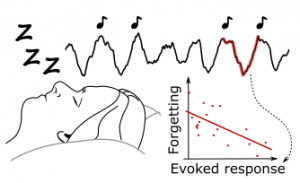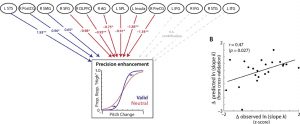I am happy and honoured that one of the leading hearing aid developers and manufacturers, Widex Sivantos Audiology (WSA), has agreed with University of Lübeck to fund 3 more exciting years of research at the Obleser lab! We will be jointly looking at the intricacies of how ageing listeners navigate a noisy world and its communication challenges.
As part of our increased efforts to understand the impact of chronobiology in sensation and perception, a new review article by senior researcher Hong-Viet Ngo in the lab and Jonas Obleser, together with psychiatrist Christina Andreou and chrononeurophysiologist Henrik Oster is forthcoming!
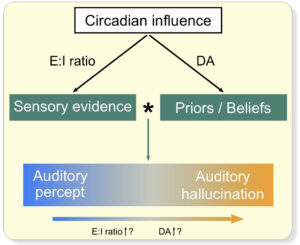
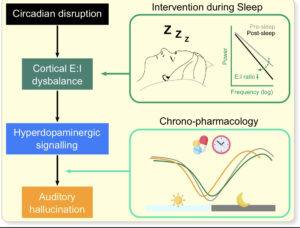
The paper summarises our (sketchy) knowledge on how circadian rhythms impact auditory hallucination propensity, and how key neural signatures E:I (dys-)balance and dopaminergic signalling jointly might contribute to hallucinations as a key symptom in psychosis. The paper has been accepted in the classic journal Acta Physiologica. A preprint version is available here.
Details are to follow, but we and our many colleagues in the Hoerhanse Lübeck [hanseatic hearing] are very pleased to have secured substantial funds to kick-start our communication and cross-fertilization platform for hearing research, training, and treatment here in Lübeck. The project will be hosted at our partner, Hanse Innovation Campus (HIC) Lübeck. HIC will also be hiring soon for this poject. Stay tuned for all the details!
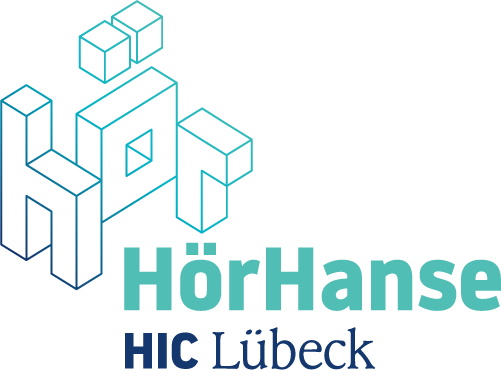
Check out this new job ad (deadline Dec 16), if you are interested in working on the complexity of high-dimensional neural data (and how to ensure its anonymity) in this exciting new project with many colleagues from Uni Lübeck and companies around us.
This post is especially suited for talents looking for slight changes in their career trajectory (psychologists going data science, IT specialists going neuro/health, or such).
Holding already a doctoral degree is nice but not a strict must-have at this stage.
Hit me up with any questions you might have. — Jonas
Sleep is central for our ability to transform newly acquired information into stable memory traces. A process hypothesized to be mediated by unique brain oscillations found solely during sleep, first in foremost the <1 Hz slow oscillation, which initiate a reactivation of the information to be consolidated. But what is the temporal relation between sleep slow oscillations and memory reactivation?
Together with Bernhard Staresina from the University of Oxford, Hong-Viet V. Ngo recently published a study utilizing targeted memory reactivation (TMR): a technique to externally drive reactivation by exposing sleeping subjects to auditory reminder cues. Using this approach, they compared the impact of slow oscillation phase on the TMR outcome, i.e. they contrasted a cueing phase-locked to slow oscillation peaks (up-states) vs. cues presenting during slow oscillation troughs (or down-states). Their results show that up-state cueing led to a significantly lower forgetting than down-state cueing. Moreover, electrophysiological brain patterns reflecting reactivated information were more pronounced after up-state cueing. Altogether these results provide important insight for the endeavor to experimentally modulate memories during sleep.
You can find the full article here.
A ticking clock in the living room; an ambient music in the café; the footsteps of a passersby on the street – We are surrounded by a plethora of distracting events with regular temporal structures in daily life. Can we ignore these distractors better?
Troby Ka-Yan Lui and Malte Wöstmann recently published a study on the effect of temporally regular versus irregular distractors on the ability to maintain items in memory. Surprisingly, they found that the temporal regularity of distractors did not have an effect on participant’s memory performance. Instead, they found an effect of the temporal regularity of distractors on response behaviour – participants were faster and more biased in responding whether the current number matched with the number in memory.
These results have theoretical implications: external distraction may have a more pervasive influence on different aspects of cognitive processes than memory maintenance. The article will soon be available in Scientific Reports.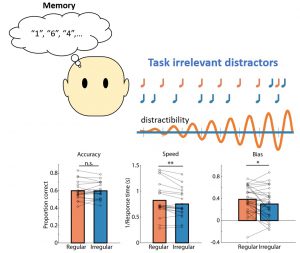
Attention lets us focus our limited cognitive resources on behaviorally important information. Less obvious is that attention also helps us to hold information in memory with high precision. But how does the brain implement this directed attention to memory, and what behavioural benefits does it yield for us humans?
Former postdoc Sung-Joo Lim (now at Binghamton University), Jonas Obleser, and a team of collaborators from Oldenburg (Christiane Thiel) and Leipzig (Bernhard Sehm, Lorenz Deserno, and Jöran Lepsien) have now a new article on this old problem, to appear in NeuroImage.
Using the changes in brain blood oxygenation as measured with fMRI, this study demonstrates that attention enables memory maintenance of speech sound information across multiple brain regions. A speech-sensitive brain region in the temporal lobe (the left superior temporal sulcus) contributes the most in predicting the individual gain in recall precision of auditory objects from memory. This study highlights that functionally discrete brain regions work together in maintaining and attentionally enhancing working memory information, but they exert differental influences depending on their functional specializations.
The full article is now available here.
In a collaboration with Sara Lena Weinhold and Robert Göder at the Christian-Albrechts-University Kiel, Hong-Viet V. Ngo recently published a study investigating the influence of auditory stimulation during sleep on memory consolidation in people with schizophrenia.
The study shows that auditory stimulation targeting slow oscillations – a key rhythm mediating memory processing – in real-time in people with schizophrenia results in an electrophysiological response that is similar to that in healthy participants. Albeit an absent effect of stimulation on memory consolidation, the authors found the stronger the slow oscillation enhancement the less participants forgot, i.e., the better memory performance was, the following morning.
Thus, this paper not only confirms the overall feasibility of this approach and provides essential electrophysiological insights. It furthermore highlights the potential of auditory stimulation to provide alternative treatments for sleep-related dysfunctions in patients with schizophrenia. The article is available here.